Early Childhood Education and Care: Social Development Report
VerifiedAdded on 2023/06/07
|7
|1862
|309
Report
AI Summary
This report examines key aspects of early childhood education and care. It begins by emphasizing the significance of social interactions in a child's development, highlighting how interactions shape future behaviors and outcomes. The report then focuses on promoting social competence among children, discussing the importance of understanding and implementing strategies to enhance their social skills. It further explores the interconnectedness of various developmental aspects and presents two insightful quotes from the book. The report also discusses the importance of developmentally appropriate practices and creating supportive classroom environments to foster learning. It presents a strategy for addressing misbehavior using a demonstration competence strategy and conflict mediation, with positive outcomes. Finally, the report raises a question about the necessity of parental involvement in addition to teacher guidance for the development of children's social behavior and skills.
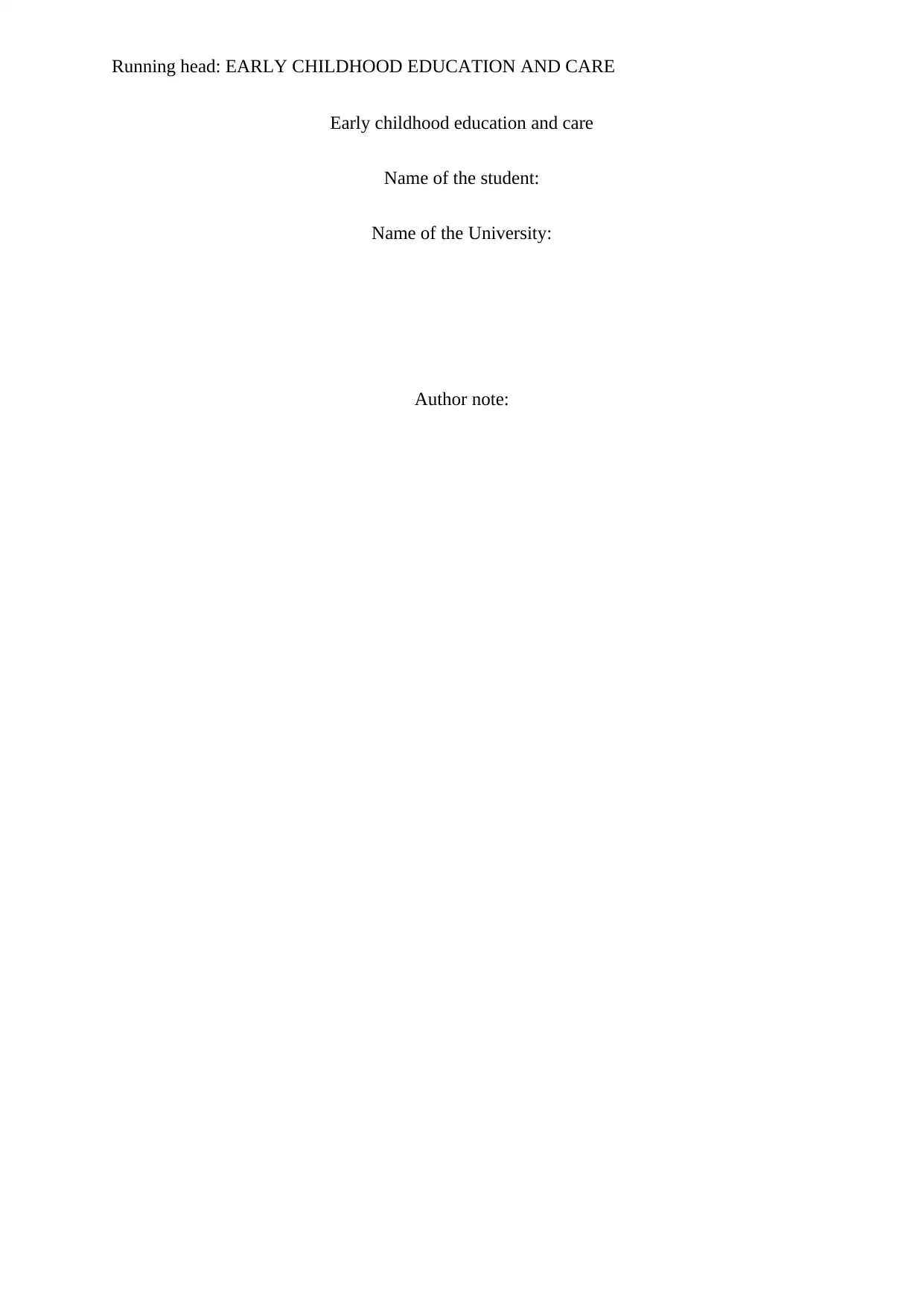
Running head: EARLY CHILDHOOD EDUCATION AND CARE
Early childhood education and care
Name of the student:
Name of the University:
Author note:
Early childhood education and care
Name of the student:
Name of the University:
Author note:
Paraphrase This Document
Need a fresh take? Get an instant paraphrase of this document with our AI Paraphraser
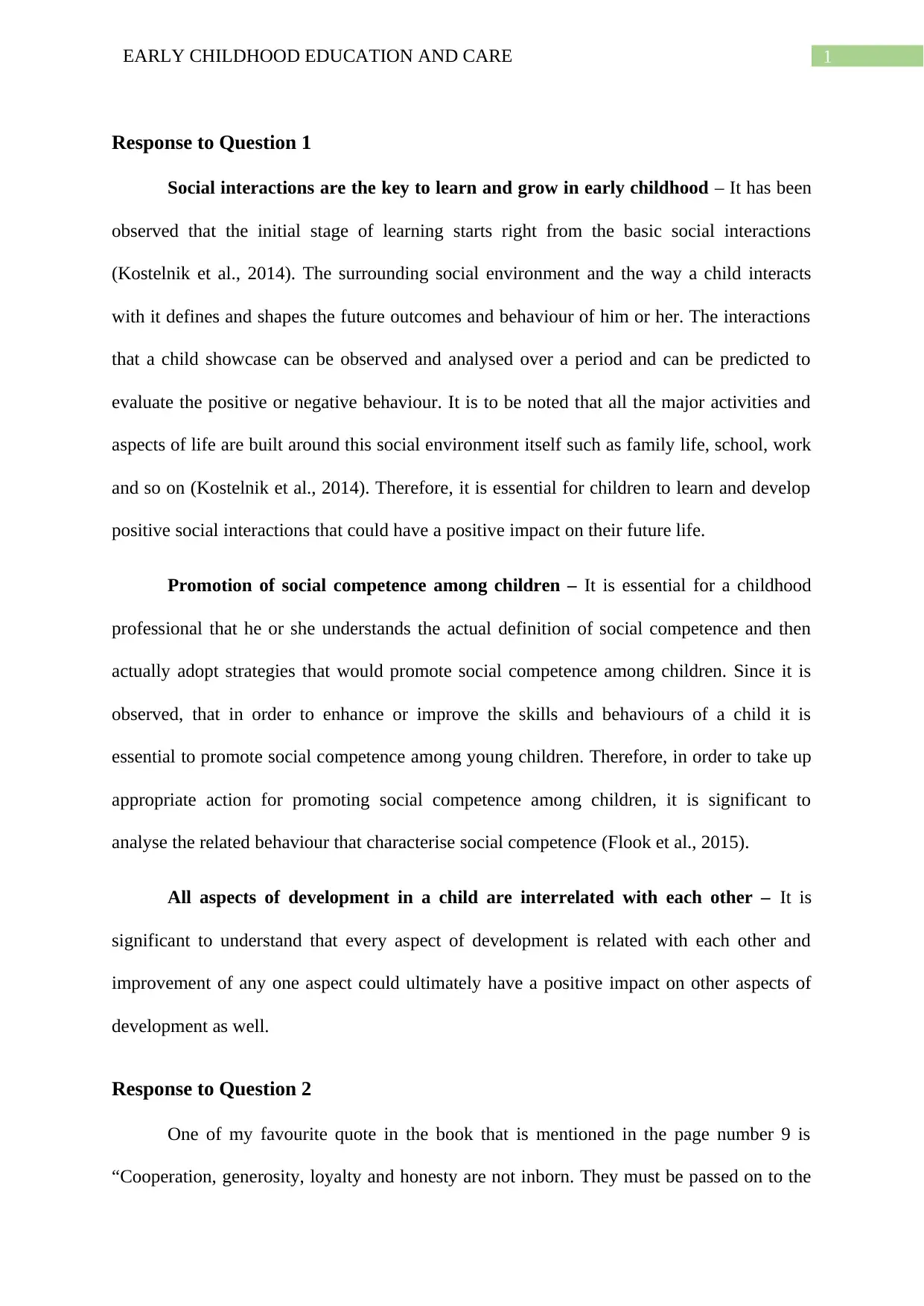
1EARLY CHILDHOOD EDUCATION AND CARE
Response to Question 1
Social interactions are the key to learn and grow in early childhood – It has been
observed that the initial stage of learning starts right from the basic social interactions
(Kostelnik et al., 2014). The surrounding social environment and the way a child interacts
with it defines and shapes the future outcomes and behaviour of him or her. The interactions
that a child showcase can be observed and analysed over a period and can be predicted to
evaluate the positive or negative behaviour. It is to be noted that all the major activities and
aspects of life are built around this social environment itself such as family life, school, work
and so on (Kostelnik et al., 2014). Therefore, it is essential for children to learn and develop
positive social interactions that could have a positive impact on their future life.
Promotion of social competence among children – It is essential for a childhood
professional that he or she understands the actual definition of social competence and then
actually adopt strategies that would promote social competence among children. Since it is
observed, that in order to enhance or improve the skills and behaviours of a child it is
essential to promote social competence among young children. Therefore, in order to take up
appropriate action for promoting social competence among children, it is significant to
analyse the related behaviour that characterise social competence (Flook et al., 2015).
All aspects of development in a child are interrelated with each other – It is
significant to understand that every aspect of development is related with each other and
improvement of any one aspect could ultimately have a positive impact on other aspects of
development as well.
Response to Question 2
One of my favourite quote in the book that is mentioned in the page number 9 is
“Cooperation, generosity, loyalty and honesty are not inborn. They must be passed on to the
Response to Question 1
Social interactions are the key to learn and grow in early childhood – It has been
observed that the initial stage of learning starts right from the basic social interactions
(Kostelnik et al., 2014). The surrounding social environment and the way a child interacts
with it defines and shapes the future outcomes and behaviour of him or her. The interactions
that a child showcase can be observed and analysed over a period and can be predicted to
evaluate the positive or negative behaviour. It is to be noted that all the major activities and
aspects of life are built around this social environment itself such as family life, school, work
and so on (Kostelnik et al., 2014). Therefore, it is essential for children to learn and develop
positive social interactions that could have a positive impact on their future life.
Promotion of social competence among children – It is essential for a childhood
professional that he or she understands the actual definition of social competence and then
actually adopt strategies that would promote social competence among children. Since it is
observed, that in order to enhance or improve the skills and behaviours of a child it is
essential to promote social competence among young children. Therefore, in order to take up
appropriate action for promoting social competence among children, it is significant to
analyse the related behaviour that characterise social competence (Flook et al., 2015).
All aspects of development in a child are interrelated with each other – It is
significant to understand that every aspect of development is related with each other and
improvement of any one aspect could ultimately have a positive impact on other aspects of
development as well.
Response to Question 2
One of my favourite quote in the book that is mentioned in the page number 9 is
“Cooperation, generosity, loyalty and honesty are not inborn. They must be passed on to the
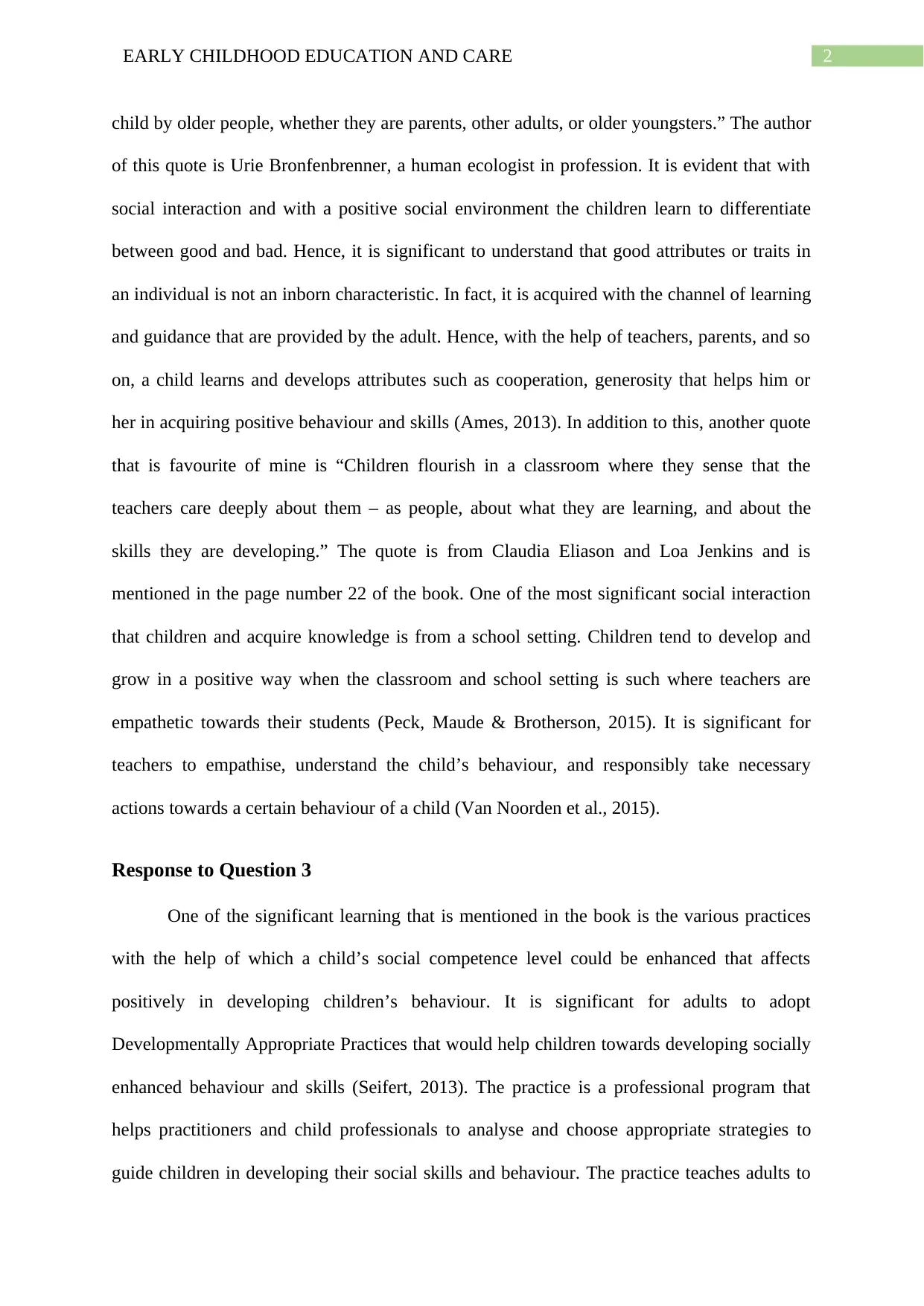
2EARLY CHILDHOOD EDUCATION AND CARE
child by older people, whether they are parents, other adults, or older youngsters.” The author
of this quote is Urie Bronfenbrenner, a human ecologist in profession. It is evident that with
social interaction and with a positive social environment the children learn to differentiate
between good and bad. Hence, it is significant to understand that good attributes or traits in
an individual is not an inborn characteristic. In fact, it is acquired with the channel of learning
and guidance that are provided by the adult. Hence, with the help of teachers, parents, and so
on, a child learns and develops attributes such as cooperation, generosity that helps him or
her in acquiring positive behaviour and skills (Ames, 2013). In addition to this, another quote
that is favourite of mine is “Children flourish in a classroom where they sense that the
teachers care deeply about them – as people, about what they are learning, and about the
skills they are developing.” The quote is from Claudia Eliason and Loa Jenkins and is
mentioned in the page number 22 of the book. One of the most significant social interaction
that children and acquire knowledge is from a school setting. Children tend to develop and
grow in a positive way when the classroom and school setting is such where teachers are
empathetic towards their students (Peck, Maude & Brotherson, 2015). It is significant for
teachers to empathise, understand the child’s behaviour, and responsibly take necessary
actions towards a certain behaviour of a child (Van Noorden et al., 2015).
Response to Question 3
One of the significant learning that is mentioned in the book is the various practices
with the help of which a child’s social competence level could be enhanced that affects
positively in developing children’s behaviour. It is significant for adults to adopt
Developmentally Appropriate Practices that would help children towards developing socially
enhanced behaviour and skills (Seifert, 2013). The practice is a professional program that
helps practitioners and child professionals to analyse and choose appropriate strategies to
guide children in developing their social skills and behaviour. The practice teaches adults to
child by older people, whether they are parents, other adults, or older youngsters.” The author
of this quote is Urie Bronfenbrenner, a human ecologist in profession. It is evident that with
social interaction and with a positive social environment the children learn to differentiate
between good and bad. Hence, it is significant to understand that good attributes or traits in
an individual is not an inborn characteristic. In fact, it is acquired with the channel of learning
and guidance that are provided by the adult. Hence, with the help of teachers, parents, and so
on, a child learns and develops attributes such as cooperation, generosity that helps him or
her in acquiring positive behaviour and skills (Ames, 2013). In addition to this, another quote
that is favourite of mine is “Children flourish in a classroom where they sense that the
teachers care deeply about them – as people, about what they are learning, and about the
skills they are developing.” The quote is from Claudia Eliason and Loa Jenkins and is
mentioned in the page number 22 of the book. One of the most significant social interaction
that children and acquire knowledge is from a school setting. Children tend to develop and
grow in a positive way when the classroom and school setting is such where teachers are
empathetic towards their students (Peck, Maude & Brotherson, 2015). It is significant for
teachers to empathise, understand the child’s behaviour, and responsibly take necessary
actions towards a certain behaviour of a child (Van Noorden et al., 2015).
Response to Question 3
One of the significant learning that is mentioned in the book is the various practices
with the help of which a child’s social competence level could be enhanced that affects
positively in developing children’s behaviour. It is significant for adults to adopt
Developmentally Appropriate Practices that would help children towards developing socially
enhanced behaviour and skills (Seifert, 2013). The practice is a professional program that
helps practitioners and child professionals to analyse and choose appropriate strategies to
guide children in developing their social skills and behaviour. The practice teaches adults to
⊘ This is a preview!⊘
Do you want full access?
Subscribe today to unlock all pages.

Trusted by 1+ million students worldwide
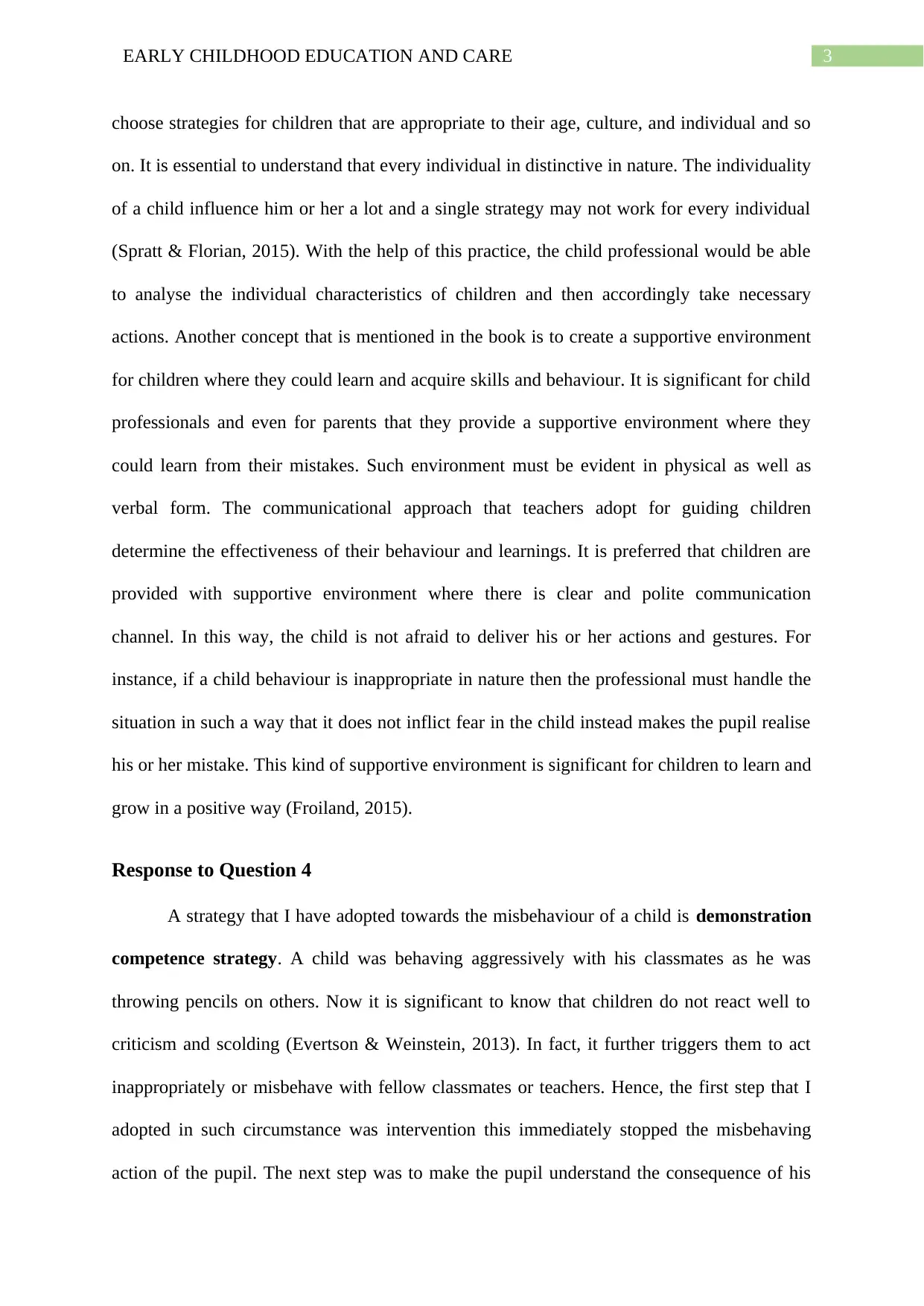
3EARLY CHILDHOOD EDUCATION AND CARE
choose strategies for children that are appropriate to their age, culture, and individual and so
on. It is essential to understand that every individual in distinctive in nature. The individuality
of a child influence him or her a lot and a single strategy may not work for every individual
(Spratt & Florian, 2015). With the help of this practice, the child professional would be able
to analyse the individual characteristics of children and then accordingly take necessary
actions. Another concept that is mentioned in the book is to create a supportive environment
for children where they could learn and acquire skills and behaviour. It is significant for child
professionals and even for parents that they provide a supportive environment where they
could learn from their mistakes. Such environment must be evident in physical as well as
verbal form. The communicational approach that teachers adopt for guiding children
determine the effectiveness of their behaviour and learnings. It is preferred that children are
provided with supportive environment where there is clear and polite communication
channel. In this way, the child is not afraid to deliver his or her actions and gestures. For
instance, if a child behaviour is inappropriate in nature then the professional must handle the
situation in such a way that it does not inflict fear in the child instead makes the pupil realise
his or her mistake. This kind of supportive environment is significant for children to learn and
grow in a positive way (Froiland, 2015).
Response to Question 4
A strategy that I have adopted towards the misbehaviour of a child is demonstration
competence strategy. A child was behaving aggressively with his classmates as he was
throwing pencils on others. Now it is significant to know that children do not react well to
criticism and scolding (Evertson & Weinstein, 2013). In fact, it further triggers them to act
inappropriately or misbehave with fellow classmates or teachers. Hence, the first step that I
adopted in such circumstance was intervention this immediately stopped the misbehaving
action of the pupil. The next step was to make the pupil understand the consequence of his
choose strategies for children that are appropriate to their age, culture, and individual and so
on. It is essential to understand that every individual in distinctive in nature. The individuality
of a child influence him or her a lot and a single strategy may not work for every individual
(Spratt & Florian, 2015). With the help of this practice, the child professional would be able
to analyse the individual characteristics of children and then accordingly take necessary
actions. Another concept that is mentioned in the book is to create a supportive environment
for children where they could learn and acquire skills and behaviour. It is significant for child
professionals and even for parents that they provide a supportive environment where they
could learn from their mistakes. Such environment must be evident in physical as well as
verbal form. The communicational approach that teachers adopt for guiding children
determine the effectiveness of their behaviour and learnings. It is preferred that children are
provided with supportive environment where there is clear and polite communication
channel. In this way, the child is not afraid to deliver his or her actions and gestures. For
instance, if a child behaviour is inappropriate in nature then the professional must handle the
situation in such a way that it does not inflict fear in the child instead makes the pupil realise
his or her mistake. This kind of supportive environment is significant for children to learn and
grow in a positive way (Froiland, 2015).
Response to Question 4
A strategy that I have adopted towards the misbehaviour of a child is demonstration
competence strategy. A child was behaving aggressively with his classmates as he was
throwing pencils on others. Now it is significant to know that children do not react well to
criticism and scolding (Evertson & Weinstein, 2013). In fact, it further triggers them to act
inappropriately or misbehave with fellow classmates or teachers. Hence, the first step that I
adopted in such circumstance was intervention this immediately stopped the misbehaving
action of the pupil. The next step was to make the pupil understand the consequence of his
Paraphrase This Document
Need a fresh take? Get an instant paraphrase of this document with our AI Paraphraser
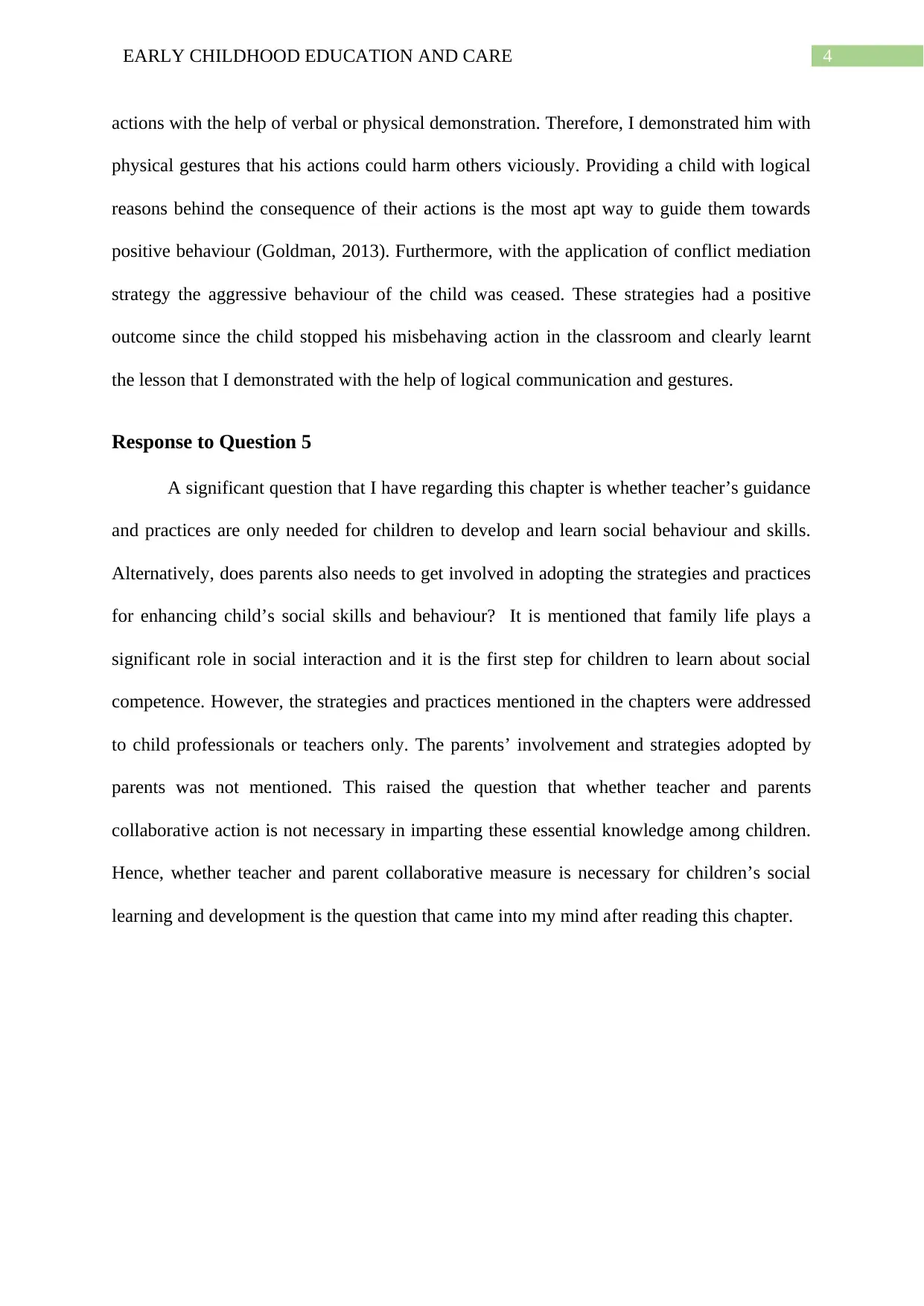
4EARLY CHILDHOOD EDUCATION AND CARE
actions with the help of verbal or physical demonstration. Therefore, I demonstrated him with
physical gestures that his actions could harm others viciously. Providing a child with logical
reasons behind the consequence of their actions is the most apt way to guide them towards
positive behaviour (Goldman, 2013). Furthermore, with the application of conflict mediation
strategy the aggressive behaviour of the child was ceased. These strategies had a positive
outcome since the child stopped his misbehaving action in the classroom and clearly learnt
the lesson that I demonstrated with the help of logical communication and gestures.
Response to Question 5
A significant question that I have regarding this chapter is whether teacher’s guidance
and practices are only needed for children to develop and learn social behaviour and skills.
Alternatively, does parents also needs to get involved in adopting the strategies and practices
for enhancing child’s social skills and behaviour? It is mentioned that family life plays a
significant role in social interaction and it is the first step for children to learn about social
competence. However, the strategies and practices mentioned in the chapters were addressed
to child professionals or teachers only. The parents’ involvement and strategies adopted by
parents was not mentioned. This raised the question that whether teacher and parents
collaborative action is not necessary in imparting these essential knowledge among children.
Hence, whether teacher and parent collaborative measure is necessary for children’s social
learning and development is the question that came into my mind after reading this chapter.
actions with the help of verbal or physical demonstration. Therefore, I demonstrated him with
physical gestures that his actions could harm others viciously. Providing a child with logical
reasons behind the consequence of their actions is the most apt way to guide them towards
positive behaviour (Goldman, 2013). Furthermore, with the application of conflict mediation
strategy the aggressive behaviour of the child was ceased. These strategies had a positive
outcome since the child stopped his misbehaving action in the classroom and clearly learnt
the lesson that I demonstrated with the help of logical communication and gestures.
Response to Question 5
A significant question that I have regarding this chapter is whether teacher’s guidance
and practices are only needed for children to develop and learn social behaviour and skills.
Alternatively, does parents also needs to get involved in adopting the strategies and practices
for enhancing child’s social skills and behaviour? It is mentioned that family life plays a
significant role in social interaction and it is the first step for children to learn about social
competence. However, the strategies and practices mentioned in the chapters were addressed
to child professionals or teachers only. The parents’ involvement and strategies adopted by
parents was not mentioned. This raised the question that whether teacher and parents
collaborative action is not necessary in imparting these essential knowledge among children.
Hence, whether teacher and parent collaborative measure is necessary for children’s social
learning and development is the question that came into my mind after reading this chapter.
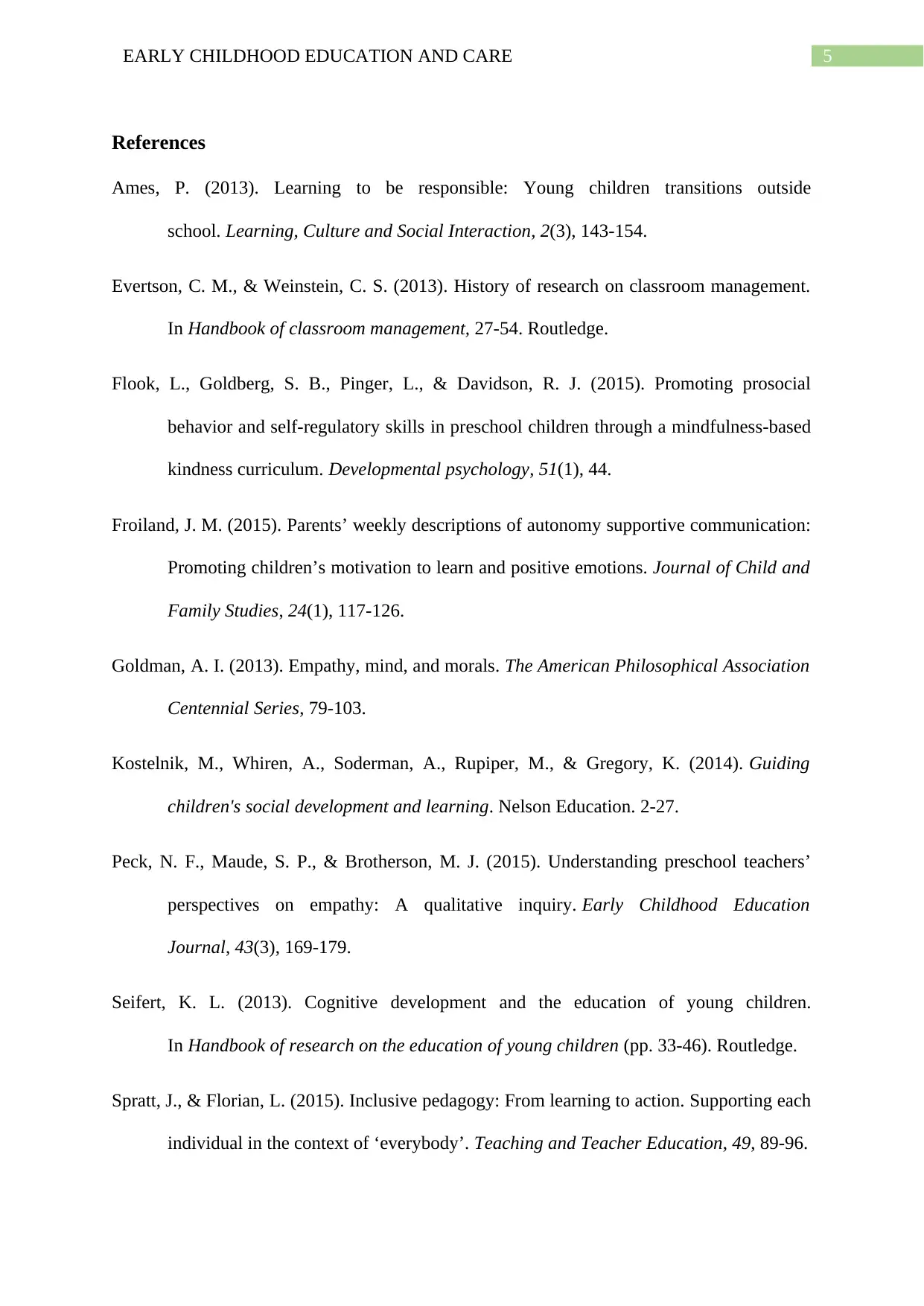
5EARLY CHILDHOOD EDUCATION AND CARE
References
Ames, P. (2013). Learning to be responsible: Young children transitions outside
school. Learning, Culture and Social Interaction, 2(3), 143-154.
Evertson, C. M., & Weinstein, C. S. (2013). History of research on classroom management.
In Handbook of classroom management, 27-54. Routledge.
Flook, L., Goldberg, S. B., Pinger, L., & Davidson, R. J. (2015). Promoting prosocial
behavior and self-regulatory skills in preschool children through a mindfulness-based
kindness curriculum. Developmental psychology, 51(1), 44.
Froiland, J. M. (2015). Parents’ weekly descriptions of autonomy supportive communication:
Promoting children’s motivation to learn and positive emotions. Journal of Child and
Family Studies, 24(1), 117-126.
Goldman, A. I. (2013). Empathy, mind, and morals. The American Philosophical Association
Centennial Series, 79-103.
Kostelnik, M., Whiren, A., Soderman, A., Rupiper, M., & Gregory, K. (2014). Guiding
children's social development and learning. Nelson Education. 2-27.
Peck, N. F., Maude, S. P., & Brotherson, M. J. (2015). Understanding preschool teachers’
perspectives on empathy: A qualitative inquiry. Early Childhood Education
Journal, 43(3), 169-179.
Seifert, K. L. (2013). Cognitive development and the education of young children.
In Handbook of research on the education of young children (pp. 33-46). Routledge.
Spratt, J., & Florian, L. (2015). Inclusive pedagogy: From learning to action. Supporting each
individual in the context of ‘everybody’. Teaching and Teacher Education, 49, 89-96.
References
Ames, P. (2013). Learning to be responsible: Young children transitions outside
school. Learning, Culture and Social Interaction, 2(3), 143-154.
Evertson, C. M., & Weinstein, C. S. (2013). History of research on classroom management.
In Handbook of classroom management, 27-54. Routledge.
Flook, L., Goldberg, S. B., Pinger, L., & Davidson, R. J. (2015). Promoting prosocial
behavior and self-regulatory skills in preschool children through a mindfulness-based
kindness curriculum. Developmental psychology, 51(1), 44.
Froiland, J. M. (2015). Parents’ weekly descriptions of autonomy supportive communication:
Promoting children’s motivation to learn and positive emotions. Journal of Child and
Family Studies, 24(1), 117-126.
Goldman, A. I. (2013). Empathy, mind, and morals. The American Philosophical Association
Centennial Series, 79-103.
Kostelnik, M., Whiren, A., Soderman, A., Rupiper, M., & Gregory, K. (2014). Guiding
children's social development and learning. Nelson Education. 2-27.
Peck, N. F., Maude, S. P., & Brotherson, M. J. (2015). Understanding preschool teachers’
perspectives on empathy: A qualitative inquiry. Early Childhood Education
Journal, 43(3), 169-179.
Seifert, K. L. (2013). Cognitive development and the education of young children.
In Handbook of research on the education of young children (pp. 33-46). Routledge.
Spratt, J., & Florian, L. (2015). Inclusive pedagogy: From learning to action. Supporting each
individual in the context of ‘everybody’. Teaching and Teacher Education, 49, 89-96.
⊘ This is a preview!⊘
Do you want full access?
Subscribe today to unlock all pages.

Trusted by 1+ million students worldwide
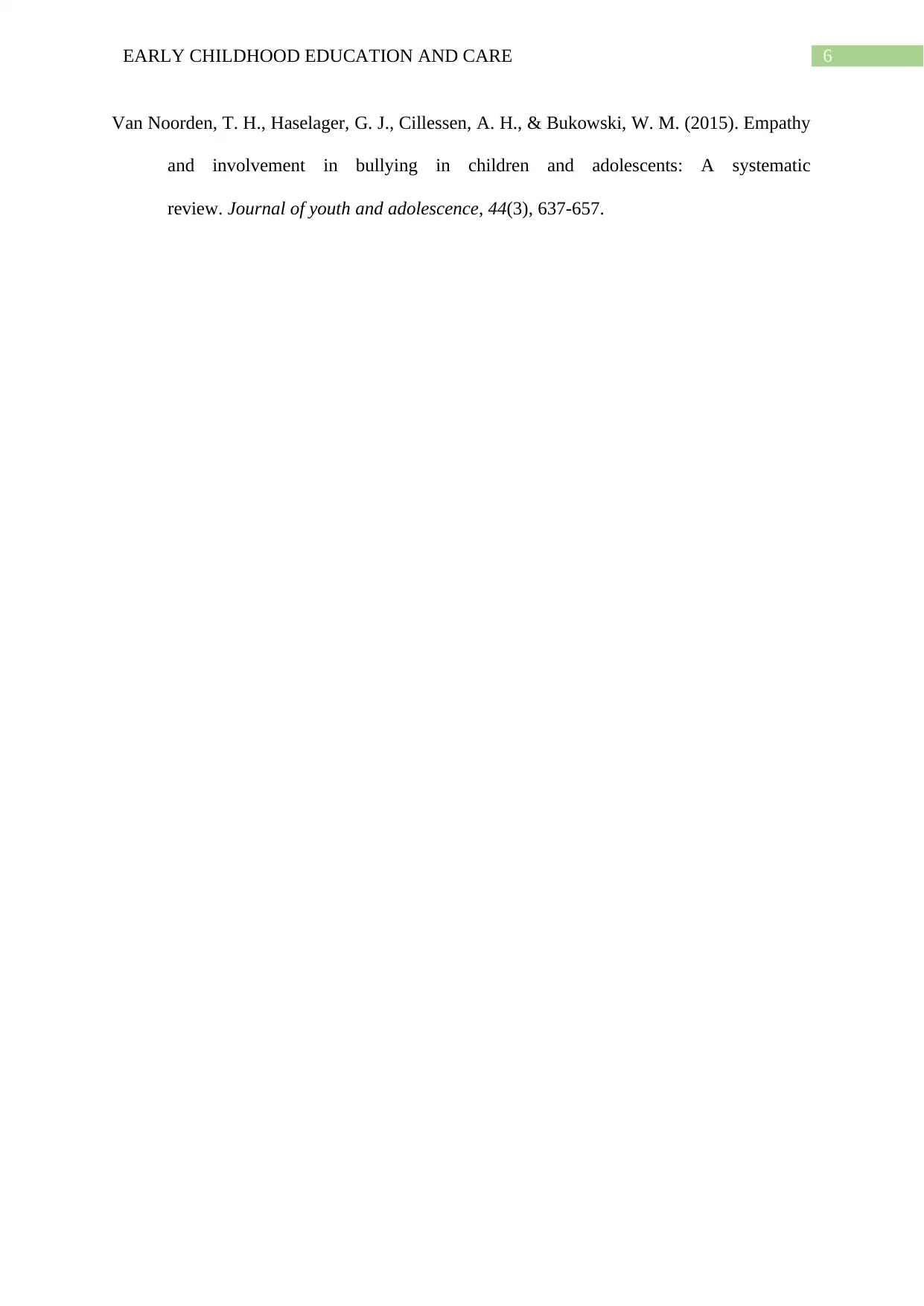
6EARLY CHILDHOOD EDUCATION AND CARE
Van Noorden, T. H., Haselager, G. J., Cillessen, A. H., & Bukowski, W. M. (2015). Empathy
and involvement in bullying in children and adolescents: A systematic
review. Journal of youth and adolescence, 44(3), 637-657.
Van Noorden, T. H., Haselager, G. J., Cillessen, A. H., & Bukowski, W. M. (2015). Empathy
and involvement in bullying in children and adolescents: A systematic
review. Journal of youth and adolescence, 44(3), 637-657.
1 out of 7
Related Documents
Your All-in-One AI-Powered Toolkit for Academic Success.
+13062052269
info@desklib.com
Available 24*7 on WhatsApp / Email
![[object Object]](/_next/static/media/star-bottom.7253800d.svg)
Unlock your academic potential
Copyright © 2020–2026 A2Z Services. All Rights Reserved. Developed and managed by ZUCOL.




